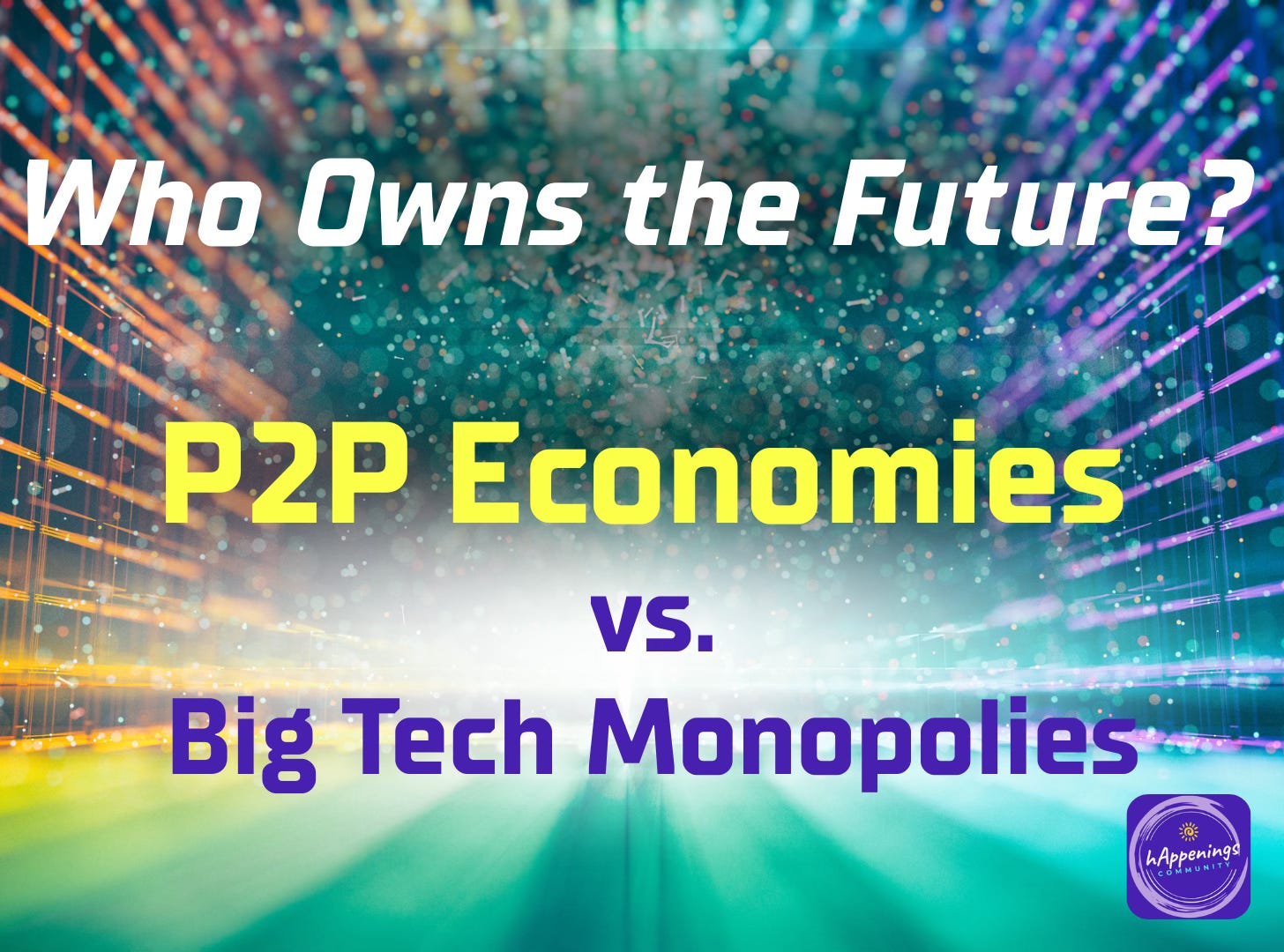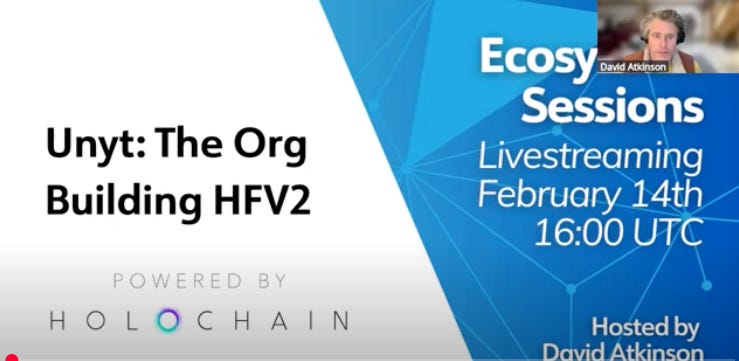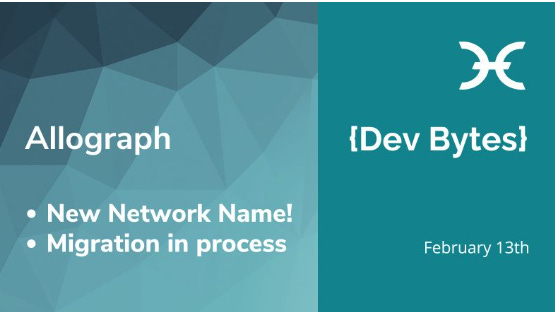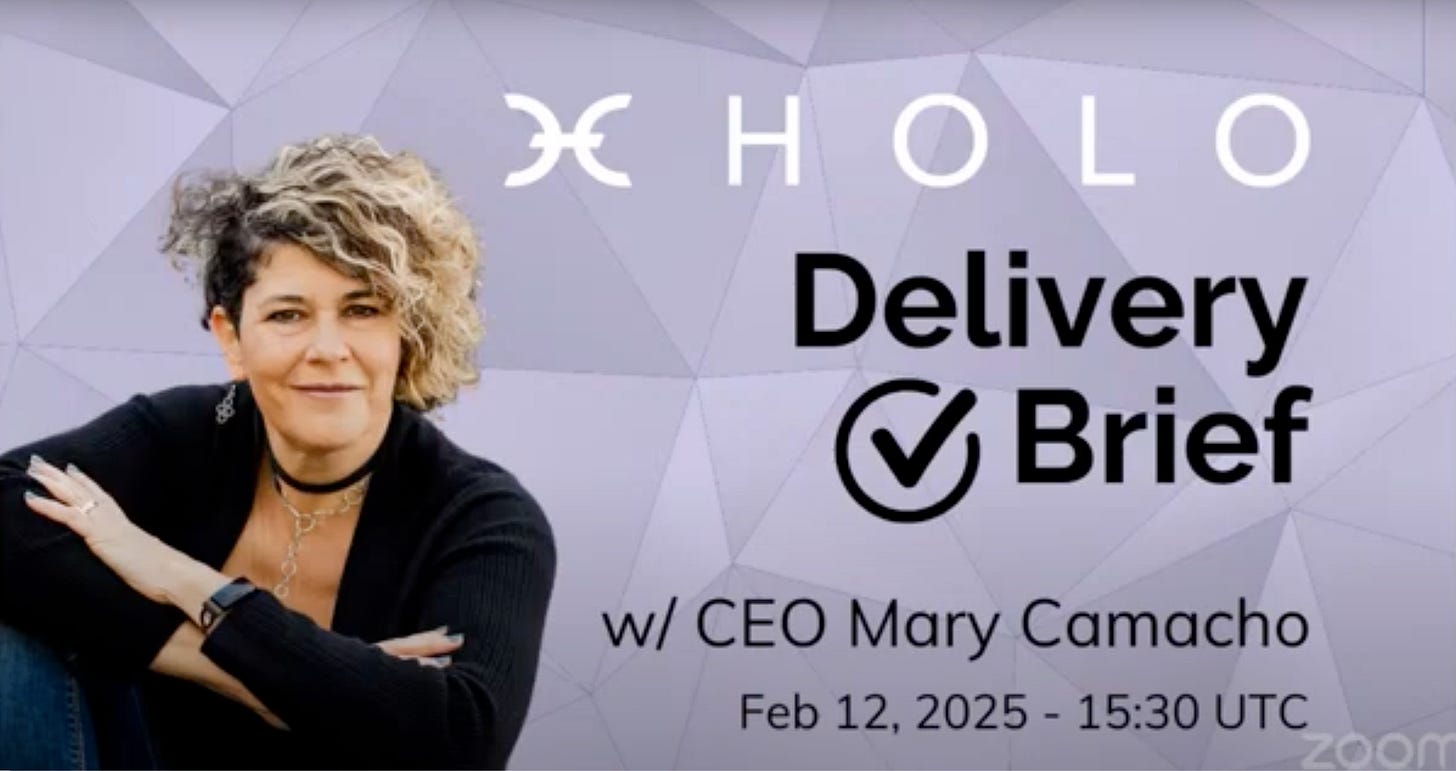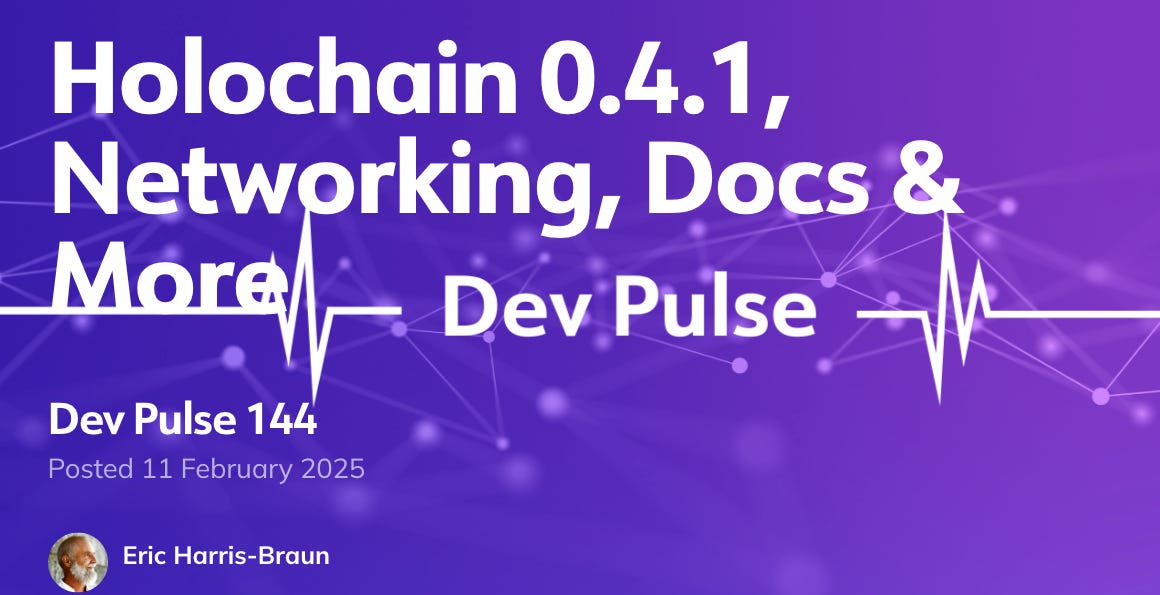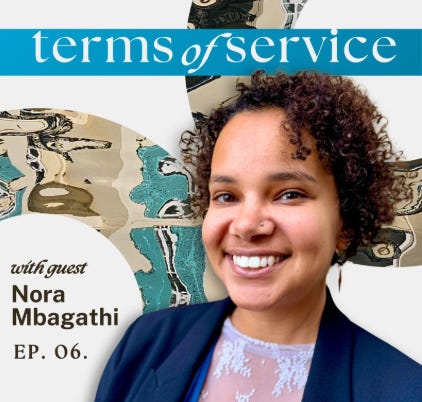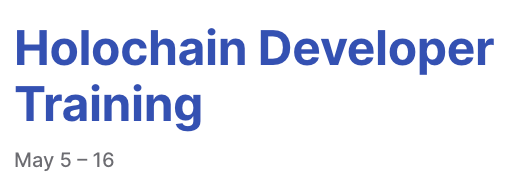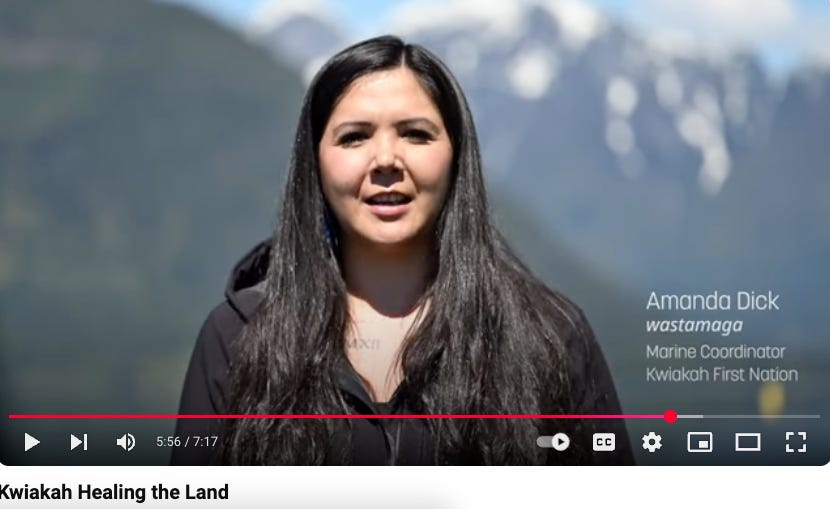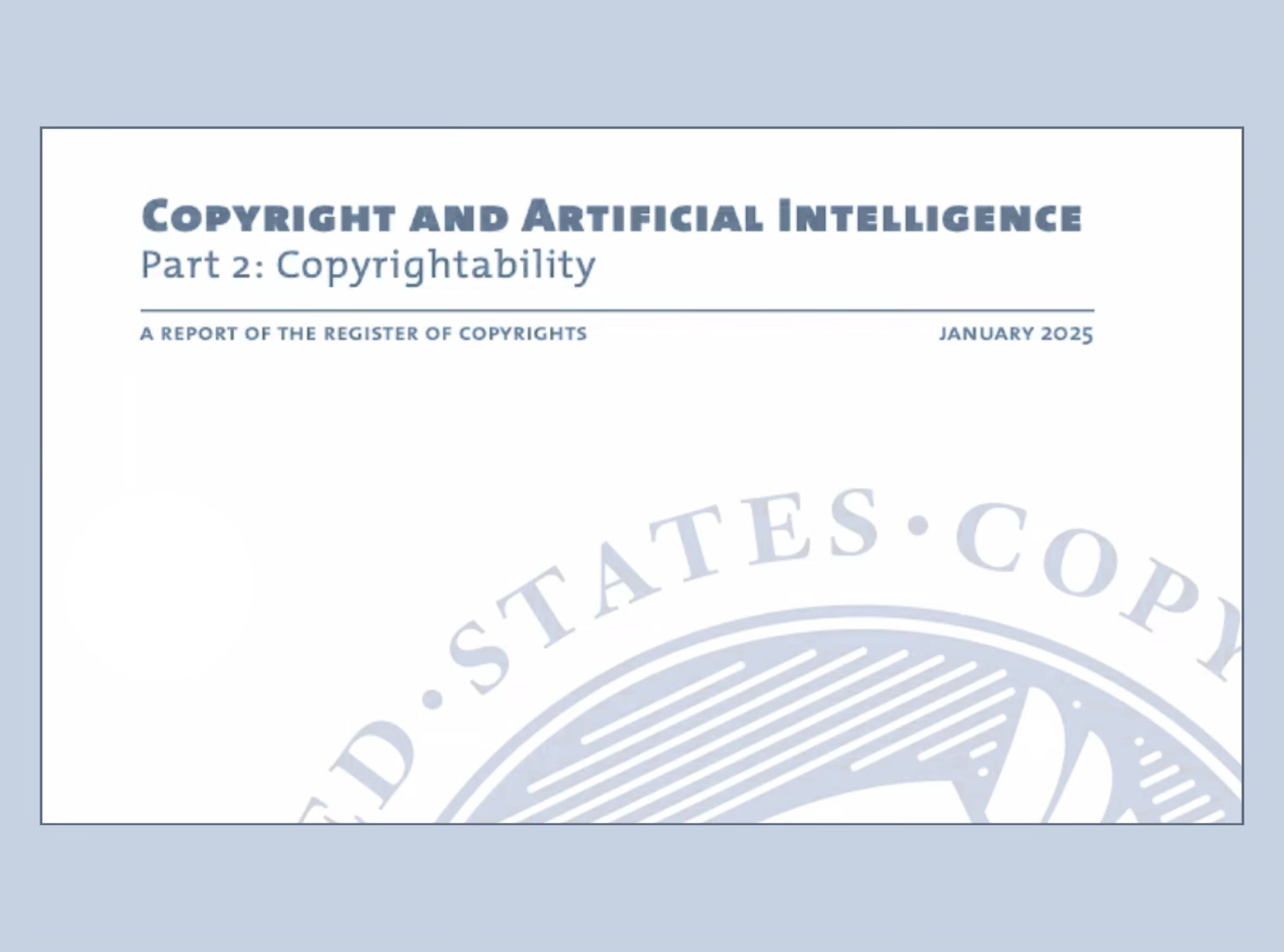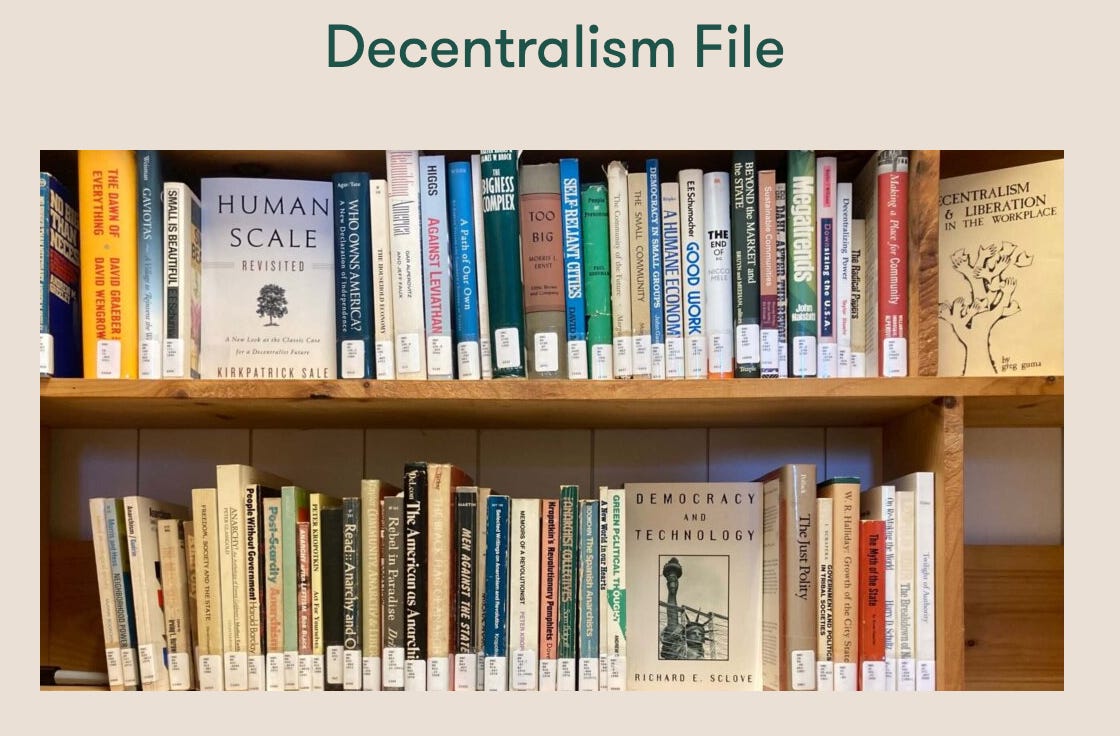Who Owns the Future? P2P Economies vs. Big Tech Monopolies
The battle for the future of economic organization is happening right now. Will digital networks empower people—or serve corporate monopolies?
About Sacha: “After completing the Holochain Dev Camp (March 2023), Sacha joined the Sensorica lab in Montreal, contributing to research and development in decentralized resource planning (hREA) and collaborative ecosystems. Now actively involved in the hAppenings.community with the Requests & Offers HC/MVP, he is committed to building the next generation of P2P marketplaces with Holochain.”
The rise of the information economy and the peer-to-peer (P2P) economy has been widely celebrated as a breakthrough in how we create and exchange value. But these paradigms have unfolded in two very different ways:
Corporate Co-optation: Tech giants, digital platforms, and data monopolies have turned these innovations into tools of extraction and control.
Economic Emancipation: Open-source, decentralized networks, and cooperative models show us how technology can liberate economic organization.
This is the tension we face: Will digital economies reinforce power structures or create new paths for economic freedom?
The Information Economy: Who Really Benefits?
The information economy has transformed knowledge into the most valuable commodity of the 21st century. But who owns and controls it?
Corporate-Controlled Information Economy
Big Tech thrives on data centralization and proprietary control. Google, Facebook, and Amazon have built economic empires by harvesting, analyzing, and monetizing information. This system:
Extracts user data in exchange for "free" services, which ultimately fuel corporate profits.
Monopolizes knowledge through AI, algorithms, and locked ecosystems that prioritize corporate interests over public good.
Turns workers into disposable assets in the gig economy, where job security is eroded in favor of maximum flexibility for companies.
This is the platform capitalism model—where digital innovation concentrates power instead of distributing it.
The Commons-Based Information Economy
But there is another model. The open-source movement, open science, and decentralized knowledge networks have proven that information can be a shared resource, not a private asset. Examples include:
Open-Source Software: Linux & Python
Open-source software exemplifies the power of collective innovation. Projects like Linux and Python prove that decentralized, community-driven development can rival and even outperform proprietary software. Unlike corporate software models that rely on licensing fees and closed ecosystems, open-source projects operate under transparent, collaborative frameworks where anyone can contribute, modify, and distribute the code.
Linux: As one of the most widely used operating systems, Linux powers everything from personal computers to enterprise cloud systems, demonstrating how open-source software can serve as critical digital infrastructure.
Python: A programming language widely adopted in fields like artificial intelligence, web development, and data science, Python’s open-source nature allows for continuous innovation without the barriers of corporate oversight.
These projects have shown that an open knowledge economy can lead to more resilient, scalable, and adaptable technological advancements compared to traditional, profit-driven models.
Wikipedia & Open Science: Democratizing Knowledge
The principles of open-source software extend to knowledge-sharing and research, challenging the monopoly of corporate publishers and academic paywalls.
Wikipedia: A freely accessible, community-edited encyclopedia, Wikipedia has become one of the most widely used knowledge repositories. Its open editing model ensures continuous refinement and broad participation, starkly contrasting with traditional, corporate-controlled encyclopedias.
Open Science: This movement advocates for freely accessible research, open peer review, and collaborative methodologies, breaking away from the restrictive models of academic publishing that often put critical knowledge behind expensive paywalls.
These commons-based approaches to information democratize access to education and research, enabling wider participation and accelerating collective progress in various fields.
3D Printing & Open Hardware: Decentralized Manufacturing
Beyond digital information, the principles of open collaboration extend into hardware and manufacturing, reshaping how we build and distribute physical goods.
3D Printing: Open-source 3D printing technology allows individuals and communities to design, modify, and produce physical objects without relying on centralized factories or supply chains. Platforms like Thingiverse provide vast repositories of freely available 3D-printable designs, empowering local innovation and decentralized production.
Open Hardware: Open hardware initiatives enable engineers and designers to share schematics and blueprints, reducing reliance on expensive proprietary solutions. Projects like Arduino and RepRap facilitate the democratization of hardware development, allowing users to build custom electronics and robotics affordably.
This model challenges traditional manufacturing monopolies by enabling distributed production, reducing supply chain vulnerabilities, and fostering local self-sufficiency.
The P2P Economy: True Decentralization or Just More Platforms?
The peer-to-peer economy promised direct, decentralized interactions—but in many cases, it has been co-opted by corporate intermediaries.
The Platform-Mediated "Sharing Economy"
Uber, Airbnb, and Kickstarter were supposed to empower individuals, but they ended up reinforcing centralized control:
Uber controls fares & labor conditions—not the drivers, leading to gig workers with little bargaining power.
Airbnb extracts value from hosts while driving up rents in major cities, exacerbating housing crises.
Crypto/Web3 was meant to decentralize finance but is increasingly dominated by venture capital and speculation, prioritizing profits over real-world applications.
These platforms rely on corporate governance, centralized algorithms, and data monopolies—a far cry from real peer-to-peer exchange. Instead of redistributing power, they recreate the same extractive structures in digital form.
The Challenge of Scaling the Commons-Based Model
While the commons-based information economy offers an inspiring alternative to corporate control, it faces key challenges in scalability, funding, and governance:
Sustainability: Many open-source and commons-based projects rely on volunteer contributions and donations, making financial sustainability difficult without corporate sponsorship or alternative funding models.
Adoption & Awareness: Despite their benefits, open-source tools and commons-based networks often struggle to gain mainstream adoption, particularly in markets dominated by proprietary incumbents.
Regulatory Hurdles: In many cases, laws and policies favor traditional corporate ownership models, making it difficult for commons-based initiatives to thrive.
Despite these challenges, the commons-based information economy proves that knowledge, innovation, and production do not have to be controlled by monopolistic entities.
The True P2P Economy: Open Value Networks & Mutual Credit
Real decentralization means removing corporate intermediariesand returning power to participants. Emerging models include:
Open Value Networks (OVNs): These are decentralized collaboration models that enable individuals and organizations to contribute to projects and share value in a transparent and equitable manner. OVNs differ from traditional corporate structures by using distributed governance, open accounting, and collaborative decision-making to ensure that all contributions—whether financial, material, or labor—are recognized and rewarded fairly.
OVNs facilitate economic coordination without requiring a central authority, allowing participants to co-create and manage resources collectively. Unlike corporate platforms that extract value from users, OVNs enable peer-driven economic interactions where participants are stakeholders rather than mere consumers or workers. Key characteristics of OVNs include:
Transparency: All contributions and exchanges are openly recorded and accessible to participants.
Decentralized Decision-Making: Governance mechanisms are built around collective input rather than top-down control.
Fair Value Distribution: Value is allocated based on predefined agreements and transparent contribution tracking.
Modular & Scalable: OVNs are adaptable, allowing networks to expand and integrate various economic activities.
By leveraging digital tools and decentralized governance models, OVNs provide an alternative to extractive capitalist economies, fostering collaborative production and equitable value distribution. Below are some notable examples of OVNs actively reshaping economic collaboration:
Sensorica: One of the most well-documented and operational OVNs, Sensorica is a decentralized network focused on open-source hardware innovation. It enables contributors to co-own intellectual property and share revenues based on their contributions, using a value accounting system to track work and distribute income fairly.
OVN Wiki: A comprehensive resource documenting the methodologies, tools, and principles behind Open Value Networks. It serves as a knowledge base for those looking to establish decentralized, value-sharing economic models.
ValueFlows: An open-source protocol designed to facilitate economic networks by enabling interoperable value exchange systems. It provides a common language and infrastructure for organizations seeking to coordinate decentralized production and trade.
Metacurrency Project: A project dedicated to building distributed economic tools that prioritize cooperative governance and meaningful value exchange, rather than speculation-driven economies.
These initiatives exemplify how OVNs can be leveraged to create transparent, decentralized, and fair economic systems that challenge traditional hierarchical corporate structures. OVNs differ from traditional corporate structures by using distributed governance, open accounting, and collaborative decision-making to ensure that all contributions—whether financial, material, or labor—are recognized and rewarded fairly.
Mutual Credit Systems: These systems enable participants to trade without relying on traditional currency. Examples include:
Sardex: A regional mutual credit system in Sardinia that enables businesses to transact without using euros, strengthening local economies.
LETS (Local Exchange Trading Systems): Community-based networks where members trade goods and services without money, often using a time-banking model.
WIR Bank (Switzerland): Operating since 1934, WIR Bank provides businesses with an alternative financial system, allowing them to issue and receive credit in a separate currency that stimulates trade and reduces dependence on traditional banks.
Community Exchange Systems: Digital barter systems that connect local economies and encourage more self-sustaining financial ecosystems. These systems foster liquidity in ways that conventional finance does not, ensuring that local businesses and individuals have access to exchange mechanisms even in times of economic downturns.
Holochain, Holo Hosting Network & HoloFuel
Holochain: A framework for building decentralized, agent-centric applications. Unlike blockchain, Holochain does not rely on a global ledger but instead allows users to store and share data in a distributed way, providing scalability, energy efficiency, and data sovereignty.
Holo Hosting Network: A cloud-hosting infrastructure that enables traditional web users to access Holochain applications (hApps) without running their own nodes. Holo Hosts provide computing power and storage in exchange for HoloFuel, creating a bridge between decentralized applications and everyday web users.
HoloFuel: A mutual credit currency designed to facilitate transactions within the Holo Hosting ecosystem. Unlike speculative cryptocurrencies, HoloFuel operates as a ledger of obligations, ensuring fluid and stable economic exchange between Holo Hosts and users requiring hosting services.
Together, these elements form a robust ecosystem that bridges the gap between decentralized technology and mainstream usability. Holochain provides the foundation for fully distributed applications, Holo Hosting enables seamless accessibility for non-technical users, and HoloFuel ensures a sustainable economic model for hosting services. By integrating these components, the Holo ecosystem offers a viable alternative to centralized cloud services, fostering a truly peer-to-peer internet.
These innovations move beyond the platform model, building truly cooperative economies that prioritize fairness, transparency, and sustainability.
The Path Forward: What Can We Do?
We are at a crossroads. The digital economy can either reinforce exploitation or create a foundation for shared prosperity.
How We Can Build an Emancipatory Digital Economy
✅ Support Open-Source & Commons-Based Projects
Choose decentralized tools over centralized platforms.
Contribute to or use open knowledge initiatives.
Advocate for fair licensing models that protect open resources from corporate enclosure.
✅ Build & Participate in Real P2P Systems
Use mutual credit & alternative currencies to reduce dependence on corporate financial systems.
Support OVNs and decentralized collaboration models that reward meaningful contributions rather than capital investment.
Help develop governance models that ensure real community control over digital infrastructure.
✅ Resist Platform Capitalism
Avoid exploitative gig economy models that commodify labor without offering stability.
Advocate for cooperative digital infrastructures where decision-making is distributed and power is shared.
Challenge the narratives that frame corporate-led digital transformation as "inevitable."
Final Thought
The future of digital economies is not just about technology—it’s about power. Who controls value? Who benefits from networks? Who owns the future?
If we don’t actively shape economic alternatives, corporate capture will define the next era of digital capitalism. But if we build decentralized, commons-based economies, we can reclaim economic power for communities, individuals, and networks of collaboration.
The battle for the future is now. Which side will you choose?
The P2P Foundation has been instrumental in documenting and advocating for genuine peer-to-peer economic models, researching alternative governance structures, and fostering open-source innovation. Founded by Michel Bauwens, the foundation provides valuable resources and case studies on decentralized collaboration and commons-based economies. Their work serves as a critical reference point for understanding the difference between platform capitalism and true peer-to-peer cooperation.
More about the P2P Foundation: p2pfoundation.net
This post marks the beginning of this blog, where we will explore the future of P2P economy, Holochain, Open Value Networks, AI in the context of collective intelligence, and other groundbreaking topics.
Our goal? To dismantle centralized control, promote true decentralization, and envision economic systems that serve people—not corporate interests.
If these ideas excite you, subscribe to stay updated—because the best is yet to come. Let’s build the future together.
🌟 Latest News from hAppenings.community
If you’re new to “What’s hAppening” and the hAppenings Community, WELCOME! We invite you to explore our website, hAppenings.community, our Holochain Project Database (searchable), and we would love if you would join our Discord Server!
Also, if you’ve you’d like to see a type of retrospective of Holochain projects, check out the back issues of this newsletter. It’s rather amazing! And we always appreciate new subscribers! Thanks, Anita Halcyon & Sam Turner!
🌟 Latest Official News and Events from Holochain and Holo
Video: Unyt: The Org Building HFV2 - Ecosystem Session hosted by David Atkinson
This is a recording of the latest Holochain Ecosystem session where we connect with ‘Unyt’ the org building HFV2 (Holofuel Version 2).
Announcement: Holo.host migration to the Allograph Network and Holo Updates from {Dev Bytes}
We’re excited to announce our migration to the Allograph network, which is the new name for Holo.Host's "next-gen" network! A move that will allow us to host a wider array of applications. Key areas include authentication, workload capabilities and network health. This upgrade marks a significant step in our growth.
Stay tuned for the public roadmap which is coming soon.
Video: Holo Delivery Brief with Mary Camacho
Watch the full video to discover how Allograph is expanding workload capabilities beyond Holochain Applications!
The Allograph network is designed to host applications for others. Allograph expands workload capabilities beyond just Holochain applications.
Exploring Partnerships - Holo.Host
Holo.Host is actively exploring partnerships to add value for all HoloPort owners. We're considering collaborations with projects building on Holochain, Web3 projects, and others to find mutually beneficial opportunities that leverage each other's technology and businesses.
Blog: Holochain 0.4.1, Networking, Docs & More - Dev Pulse 44
Here’s our progress in the last two weeks.
Join Holochain.org’s Developer Portal: https://developer.holochain.org/
For a complete listing of all of the Holo Ltd and Holochain Foundation events go to their ‘Upcoming Events’ page!
🌟Latest News from the Holoverse:
Terms of Service Podcast: Constitutional Rights, Tech Governance, and Power Structures featuring Nora Mbagathi with host Mary Camacho
Kenya’s 2010 Constitution was born from a moment of national reflection and shaped by the voices of its people. But a constitution isn’t just written—it must be lived.
In this episode of Terms of Service Podcast, I spoke with Nora Mbagathi, Director at Katiba Institute (KI), about what it takes to bring constitutional rights to life for all citizens—across rural and urban communities.
From public participation to constitutional literacy, we explore how Kenya’s groundbreaking constitution continues to evolve and protect its people.
Update - Holochain Developer Training
The first Darksoil Holochain Developer Training is going well and it is satisfying to see all the learning happen. We are really excited for what our participants have already started building with Holochain.
We will open up another cohort as we get closer to May.
Check out the training and sign up for the waitlist now so you are first in line to receive an invitation to join:
🌟Other Related News & Events
Video: Kwiakah Healing the Land - shared by Pete Corke
Jody Holmes talking about the great work being done by Kwiakah First Nation on their beautiful territory. This area forms the pilot for Kwaxala's model and the first Living Forest Share issuance.
This is Chief Steven of Kwiakah First Nation who I am honoured to report to as our Chairman at Kwaxala. The Kwiakah territory is the location of our pilot project and our first Living Forest Shares will be issued later this year enabling direct investment into these critical forests alongside the Kwiakah. The first shares of their type to be issued anywhere in the world. If you are interested to learn more (to invest or to use our model to fund the protection and regeneration of your lands) then please do get in touch. We also have some very high quality forest carbon offsets available so if you are looking to counterbalance your impact directly and meet an offsetting commitment we can help with that too.
Video: What Eli said at the Vatican - from New_Public
Here’s the full behind-the-scenes scoop on New_ Public Co-Director Eli Pariser’s trip to the Vatican at the invitation of Pope Francis, as well as the full text of Eli’s talk.
Resource: Copyright and Artificial Intelligence Report
Such an important ruling! This is one of the key things that Van Lindberg talked with me about on the Terms of Service Podcast late last year. - Mary Camacho
Resource - The Decentralism File
Looking for practical ideas to support local communities? The Decentralism File is filled with resources about building stronger, more independent economies. From helpful articles to thought-provoking books, it’s the perfect place to learn and grow.
Topics include:
Local economies
Community action
Sustainable practices
Start exploring today and share what stands out to you!
Do You Have News & Updates?
If you are a team member of a Holochain Project and would like to share your latest news and updates, please…
If you have a question, request, or simply a desire to connect more about hAppenings.community please click the link above!




